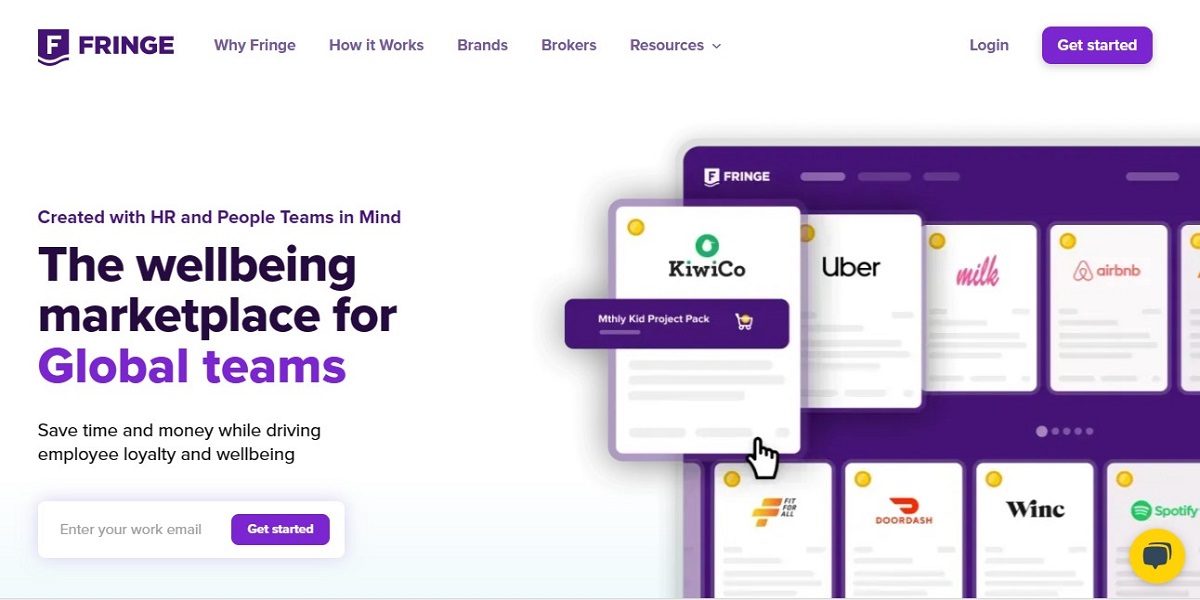 Fringe, an HR tech startup enabling companies to offer customizable perks and benefits to employees, today announced that it raised $17 million in a funding round led by Origin Ventures and Felton Group. CEO Jordan Peace says that the proceeds will be put toward growing the team from 72 employees to more than 100 by the end of the year, developing product, and expanding Fringe to more countries.
Fringe, an HR tech startup enabling companies to offer customizable perks and benefits to employees, today announced that it raised $17 million in a funding round led by Origin Ventures and Felton Group. CEO Jordan Peace says that the proceeds will be put toward growing the team from 72 employees to more than 100 by the end of the year, developing product, and expanding Fringe to more countries.
Peace started Fringe in 2018 with college friends Jason Murray, Isaiah Goodall, Andrew Dunlap and Chris Luhrman. Together, they sought to build a benefits platform that allows staff to pick and choose the perks that best meet their needs and life stage.
“We realized that] most people — especially Millennials and GenZs — didn’t understand their dated benefits, nor appreciate them,” Peace said. “We also noticed that most companies treat benefits and perks as a one-size-fits-all solution — with standardized offerings that don’t truly meet the needs of their people.”
With the advent of the pandemic, there was a newfound sense of urgency across the enterprise to revamp perks to reflect the shift to remote work — a development Peace says was to Fringe’s benefit. As opposed to perks tied to physical workplaces, such as gym memberships and catered lunches, Fringe offered — and still offers — deals from location-agnostic vendors like DoorDash, Uber and Airbnb.
Today, Fringe hosts a marketplace of perks from around 450 vendors, including virtual fitness, virtual coaching, wellness online therapy, streaming services, and food and grocery delivery. The platform consolidates stipends and reimbursement platforms, providing options and tools for employee rewards and recognition, peer-to-peer giving, employee donations and recruiting incentives.
Fringe makes money by charging employers $5 per employee per month, with the rate decreasing for larger organizations. Companies place the dollars they’d normally spend on lifestyle benefits into the Fringe accounts of employees, where they’re converted to “points” that can be spent on the aforementioned vendors. Fringe negotiates a discount of between 10% and 60% off the services, which it passes along to the employees through its rebate system.
A raft of new startups is competing to offer benefits tailored to a younger, pandemic-era workforce. There’s Compt , which allows teams to assign set stipends in broad categories like “health and wellness” or “family” and then let employees pick services in those categories that appeal to them. Cherry and Forma, like Fringe, let employees choose their own office perks and benefits. And Origin puts a twist on the formula, offering financial planning services as a perk.
But with over 200 customers, including Chegg, Lemonade and Shipt, Peace believes Fringe is in a place of strength. He demurred when asked about revenue but noted that Fringe recently signed a partnership with tech services provider Alight to bring the Fringe platform to large enterprise customers.
“While many industries have taken a hit in the pandemic, for us, it greatly accelerated the adoption of lifestyle benefits as employers urgently sought out ways to support their people through the crisis,” Peace said. “The demand for our product has never been greater. Given how significantly the world (and its workplaces) have evolved in the last few years, and the fact that hybrid and remote work are likely here to stay, we’re optimistic that this trend will only continue. When your people are working from everywhere, providing flexible lifestyle benefits is a deal maker.”
To date, Fringe has raised $21 million in venture capital.
 Fringe, an HR tech startup enabling companies to offer customizable perks and benefits to employees, today announced that it raised $17 million in a funding round led by Origin Ventures and Felton Group. CEO Jordan Peace says that the proceeds will be put toward growing the team from 72 employees to more than 100 by the end of the year, developing product, and expanding Fringe to more countries.
Fringe, an HR tech startup enabling companies to offer customizable perks and benefits to employees, today announced that it raised $17 million in a funding round led by Origin Ventures and Felton Group. CEO Jordan Peace says that the proceeds will be put toward growing the team from 72 employees to more than 100 by the end of the year, developing product, and expanding Fringe to more countries.